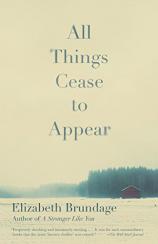Excerpt
Excerpt
All Things Cease to Appear

February 23, 1979
Again, it was snowing. Half past five in the afternoon. Almost dark. She had just laid out their plates when the dogs started barking.
Her husband set down his fork and knife, none too pleased to have his supper interrupted. What’s that now?
June Pratt pulled aside the curtain and saw their neighbor. He was standing there in the snow, holding the child, her feet bare, neither of them in coats. From the looks of it, the little girl was in her pajamas. It’s George Clare, she said.
What’s he selling?
I wonder. I don’t see a car. They must’ve come on foot.
Awful cold out. You better see what he wants.
She let them in with the cold. He stood before her, holding the child out like an offering.
It’s my wife. She’s—-
Momma hurt, the child cried.
June didn’t have children of her own, but she had raised dogs her whole life and saw the same dark knowing in the child’s eyes that confirmed what all animals understood, that the world was full of evil and beyond comprehension.
You’d better call the police, she told her husband. Something’s happened to his wife.
Joe pulled off his napkin and went to the phone.
Let’s go find you some socks, she said, and took the child from her father and carried her down the hall to the bedroom where she set her on the bed. Earlier that afternoon, she had laid her freshly laundered socks over the radiator, and she took a pair now and pushed the warm wool over the child’s feet, thinking that if the child were hers she’d love her better.
They were the Clares. They had bought the Hale place that summer, and now winter had come and there were just the two houses on the road and she hadn’t seen them much. Sometimes in the morning she would. Either when he raced past in his little car to the college. Or when the wife took the child out of doors. Sometimes, at night, when June walked the dogs, you could see inside their house. She could see them having supper, the little girl between them at the table, the woman getting up and sitting down and getting up again.
With the snow, it took over a half--hour for the sheriff to arrive. June was vaguely aware, as women often are of men who desire them, that Travis Lawton, who had been her classmate in high school, found her attractive. That was of no consequence now, but you don’t easily forget the people you grew up with, and she made a point of listening carefully to him, and acknowledged his kindness to George, even though there was the possibility, in her own mind at least, that the bad thing that had happened to his wife might have been his own doing.
he was thinking of Emerson, the terrible aristocracy that is in Nature. Because there were things in this world you couldn’t control. And because even now he was thinking of her. Even now, with his wife lying dead in that house.
He could hear Joe Pratt on the phone.
George waited on the green couch, shaking a little. Their house smelled like dogs and he could hear them barking out back in their pens. He wondered how they could stand it. He stared at the wide boards, a funk of mildew coming up from the cellar. He could feel it in the back of his throat. He coughed.
They’re on their way, Pratt said from the kitchen.
George nodded.
Down the hall, June Pratt was talking to his daughter with the sweet tone people use on children and he was grateful for it, so much so that his eyes teared a little. She was known for taking in strays. He’d see her walking the road with the motley pack at her side, a middle--aged woman in a red kerchief, frowning at the ground.
After a while, he couldn’t say how long, a car pulled up.
Here they are now, Pratt said.
It was Travis Lawton who came in. George, he said, but didn’t shake his hand.
Hello, Travis.
Chosen was a small town and they were acquaintances of a sort. He knew Lawton had gone to RPI and had come back out here to be sheriff, and it always struck George that for an educated man he was pretty shallow. But then George wasn’t the best judge of character and, as he was continually reminded by a coterie of concerned individuals, his opinion didn’t amount to much. George and his wife were newcomers. The locals took at least a hundred years to accept the fact that somebody else was living in a house that had, for generations, belonged to a single family whose sob stories were now part of the local mythology. He didn’t know these people and they certainly didn’t know him, but in those few minutes, as he stood there in the Pratts’ living room in his wrinkled khakis and crooked tie, with a distant, watery look in his eyes that could easily be construed as madness, all their suspicions were confirmed.
Let’s go take a look, Lawton said.
They left Franny with the Pratts and went up the road, him and Lawton and Lawton’s undersheriff, Wiley Burke. It was dark now. They walked with grave purpose, a brutal chill under their feet.
The house sat there grinning.
They stood a minute looking up at it and then went in through the screened porch, a clutter of snowshoes and tennis rackets and wayward leaves, to the kitchen door. He showed Lawton the broken glass. They climbed the stairs in their dirty boots. The door to their bedroom was shut; he couldn’t remember shutting it. He guessed that he had.
I can’t go in there, he told the sheriff.
All right. Lawton touched his shoulder in a fatherly way. You stay right here.
Lawton and his partner pushed through the door. Faintly, he heard sirens. Their shrill cries made him weak.
He waited in the hall, trying not to move. Then Lawton came out, bracing himself against the doorjamb. He looked at George warily. That your ax?
George nodded. From the barn.
All Things Cease to Appear
- Genres: Fiction, Mystery, Psychological Suspense, Psychological Thriller, Suspense, Thriller
- paperback: 464 pages
- Publisher: Vintage
- ISBN-10: 1101911484
- ISBN-13: 9781101911488








